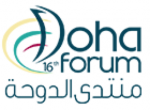Heads of State and Government and UN officials gathered for the 16th session of the Doha Forum to discuss 'Stability and Prosperity for All.' Participants stressed the importance of regional and international cooperation to combat extremism and violence, in addition to the need for the UN to play its mediating role, especially with regard to the UN Security Council's resolutions on the role of women, the fair distribution of wealth, and the launch of new initiatives aimed at protecting human rights, eliminating violence and eradicating terrorism.
 23 May 2016: Heads of State and Government and UN officials gathered for the 16th session of the Doha Forum to discuss the theme, ‘Stability and Prosperity for All.’ Participants stressed the importance of regional and international cooperation to combat extremism and violence, in addition to the need for the UN to play its mediating role, especially with regard to the UN Security Council’s resolutions on the role of women, the fair distribution of wealth, and the launch of new initiatives aimed at protecting human rights, eliminating violence and eradicating terrorism.
23 May 2016: Heads of State and Government and UN officials gathered for the 16th session of the Doha Forum to discuss the theme, ‘Stability and Prosperity for All.’ Participants stressed the importance of regional and international cooperation to combat extremism and violence, in addition to the need for the UN to play its mediating role, especially with regard to the UN Security Council’s resolutions on the role of women, the fair distribution of wealth, and the launch of new initiatives aimed at protecting human rights, eliminating violence and eradicating terrorism.
The Forum took place from 21-23 May 2016, in Doha, Qatar.
Addressing the Forum, UN Secretary-General Ban Ki-moon stressed that women have a vital role to play, not just as recipients of protection but as agents of peace, and called for empowering young people to realize their potential as peacebuilders. He added that civil society must play its crucial role, and expressed concern about new laws and attacks that infringe on the rights of NGOs. Ban also explained that the UN is placing new emphasis on sustaining peace by addressing root causes, promoting reconciliation, and moving towards recovery, reconstruction and development.
UN General Assembly (UNGA) President Mogens Lykketoft spoke about ways in which the UN could support Member States alongside the organization’s three pillars: development, human rights, and peace and security. In the area of sustainable development, he said a more streamlined and focused UN can help governments mobilize the capacity and resources needed to implement the Sustainable Development Goals (SDGs), including by tackling illicit financial flows and enacting regulatory framework to encourage green investment. On human rights, Lykketoft said the UN must help Member States lay the foundations for better compliance with international human rights law and reassert the need for strict adherence to international humanitarian law. On maintaining international peace and security, he noted that the UN will strive to: become better at preventing conflicts and mediating peace; offer more tailored support in addressing terrorism; and maintain its relevance and usefulness for global, regional or local powers.
Sheikh Mohammed bin Abdulrahman Al-Thani, Minister of Foreign Affairs of Qatar, underlined the need to settle disputes by peaceful means, especially through mediation. Ramona Manescu, Chairman of the Qatari-European Friendship Group, called for addressing the root causes of current conflicts: scarcity in access to education; lack of economic opportunities; poor infrastructure; and weak state capacity. Nasser bin Abdulaziz Al Nasr, High Representative for the UN Alliance of Civilizations (UNAOC), urged participants to strengthen cooperation among international communities, NGOs and civil society institutions to address the roots of terrorism and extremism. [Forum Website] [UN Press Release] [Remarks of UN Secretary-General] [Remarks of UNGA President]